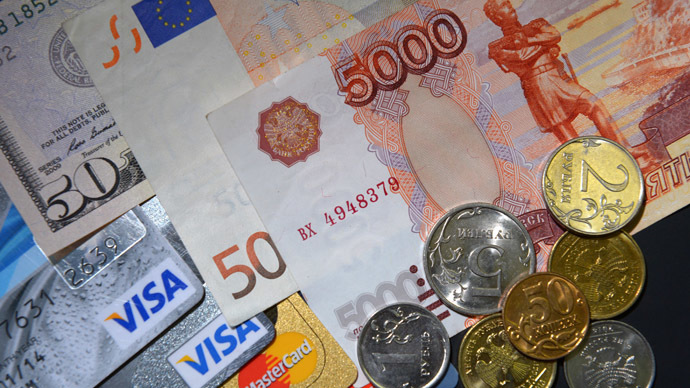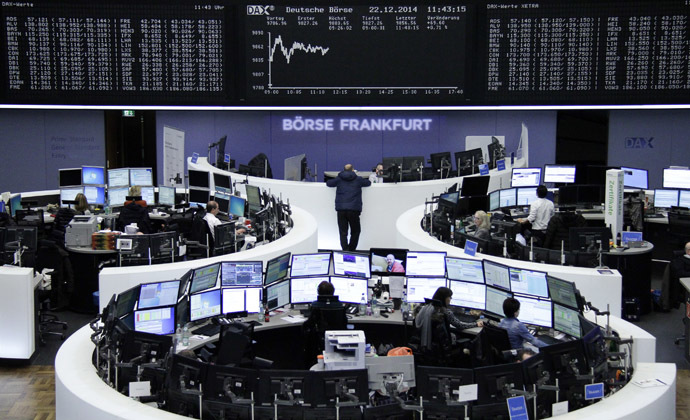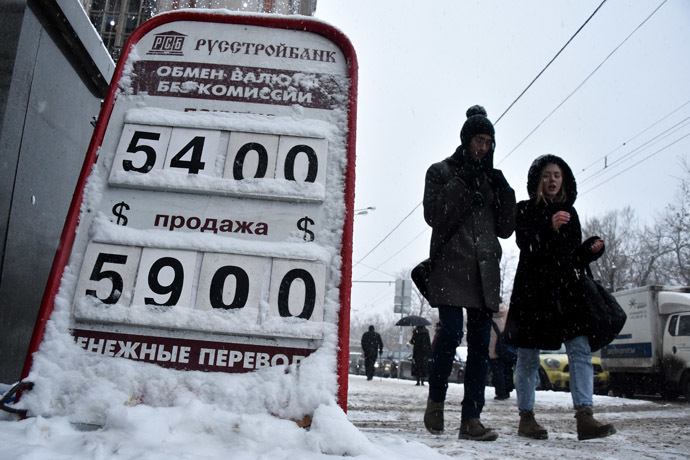‘West shoots itself in the foot with Russian sanctions’

The Russian economy cannot be fully excluded from the global monetary system, attempts to do so along with imposing more sanctions, will lead to a further fall in the ruble and a financial crisis similar to 2008, economic analyst Michael Mross told RT.
RT:The German business community forecasts a 20 percent fall in German exports to Russia. How is Germany's export-dependent economy going to make up for that drop?
Michael Mross: This will be a very big problem. As you already know, not only Germany but also the whole EU and Brussels, the eurozone is on the brink of recession. This recession will come true if these problems with Russia and the ruble situation go on. When you have a devaluation of your money, of your currency of about 50 percent, then all companies that are involved have big problems. For example, the trade between Germany and Russia is about €30 billion and if the ruble devalues by about 50 percent, then you have only €15 billion left. And this is a big problem that everybody is facing here in Germany.
READ MORE:Slumping Russian ruble threatens German economy – top exec
RT:Which industries do you think will be most affected by this?
MM: Almost every big company in Germany has economic relations with Russia. If you take those companies that are listed in the DAX .. you take E.ON…or Adidas, the biggest German sports company; they all have operations in Russia. If the ruble devalues by about 45-50 percent, then the income of these companies will reduce by this amount. And this will be a very big problem also in future – business people will be more cautious with Russia, with the Russian economy, they will not start the new companies, they will not create new proposals to make something together and this all will end up or worsen, make even stronger the economic problems that we have in Germany and in the whole EU.
RT:Does Germany and the rest of the EU have avenues to compensate for its lost trade with Russia?
MM: They try to compensate the losses with Russia but they will not be able to because we are in the situation at the moment when we have very big difficulties to make a new business with anybody in Europe and also with the US. Russia is very important for the German economy. The closer you come to Russia, the more important is Russia, naturally. So I cannot understand if it is possible to compensate for these losses that we have with Russia.

RT:The West claims that it wanted to “punish” Russia but it seems that they are suffering a lot as well. Is it worth trying to bring the Russian economy down when there is a threat of getting into the same troubles?
MM: If you want to make problems with Russia, you make problems to yourself. This is exactly what everybody knows here in Germany but nobody dares to say officially. When you speak behind closed doors with the bosses of the big companies in Germany, they are all very afraid of what is going on with Russia and they do not stand behind these sanctions. They say that we have to solve these problems the other way, with political means, for example. But officially it’s ok, sanctions must be implemented, and they will have to pay the price. They are shooting themselves in their own foot and they know it. They know they’ll have big losses and it will be complicated to compensate for these losses in the future. Even more, the problems that we have in Russia, especially with the economy and with the ruble depreciation will also have a ripple effect on the world economy because the money system itself is an own entity, it has no borders, and you cannot exclude Russia and the big Russian economy entirely from the system. If you do this, the system will face many big problems in the future. I predict if the sanctions go on and even be deepened in the future, and the problems will not be solved, the ruble will fall further more, then we will have another financial crisis, something like we had in year 2008 and it will be very difficult to solve this.
RT:Do you think any other Western nations will be affected the way Germany appears to be? Will problems with Russian economy have an impact on cooperation with EU companies?
MM: It’s not only normal cooperation; it’s not only normal big companies that will face problems with this ruble depreciation and sanctions that we have implemented. It’s the whole monetary system. When you see, for example, banks, which are very important, we have just rescued all those European banks, and they all have huge loans in Russia or gave to Russian companies huge credit. If the ruble devalues like it did in recent days, then those companies will have big troubles to pay back these debts in dollars or euro. So from this perspective we will face even higher and bigger problems. For example, Austrian and French banks are very deeply involved with credit to Russian companies and also to the Russian government. These credits now are to be written down because those companies that are facing ruble devaluation of 50 percent have to work either 100 percent more in order to fulfill their debt services or they have to write down what they got on credit from Western banks. You don’t read anything about this in the press right now but this will come to the surface very soon. Then we’ll have also a banking crisis that is triggered by the sanctions and also by the ruble devaluation.

RT:Vladimir Putin said the Russian economy will take two years to regenerate. Do you think that time will be enough?
MM: We are now in a very difficult situation. Nobody can exactly forecast how this will be solved. In my personal view, you will have these currency problems going on also in the future. It’s not about the West not trusting the ruble anymore because Western investors don’t have the ruble. It’s about the trust of the Russian people themselves in the ruble and ... If the ruble can be stabilized in the future, then those problems could be solved earlier than [in] two years. But if the ruble will stay as deep as it is now or if it will go even deeper, then two years will not be enough.
READ MORE:Ruble crisis LIVE UPDATES
RT:The Russian President has blamed “external factors” for Russia's current economic woes. Is the current crisis entirely externally-generated?
MM: The crisis was triggered by the sanctions but the ruble devaluation is not triggered by the Western community, in my opinion, because you can only sell rubles if you have rubles. I don’t know any investor that has rubles in his pockets or on his bank account. So this is an entirely internal question if the ruble will go up or down, it’s a matter of Russian people who either keep their rubles or sell it for dollars or euro. So maybe they impose currency controls in the future so that it means that you cannot exchange ruble anymore for dollars or euro, or they keep it open and then we’ll have some more problems to face in the future if not all these sanctions things can be solved politically. If there is any step behind, any solution that could solve this crisis… We heard already from the German Foreign Minister Steinmeier that he is against more sanctions against Russia. So if these sanctions will be lifted, then we’ll have a relaxation in the system and the ruble will also climb, in my opinion, but as long as frontiers are like this, it will be very difficult.
RT:Russia has the markets in Asia to turn to. What kind of partnerships can the EU find?
MM: You cannot make a partnership in one month or in half a year. Those economic relationships have grown through decades. Also when it comes to the Russian and Western relationship in terms of the economy, it will not be possible to replace those economic ties with any other part of this world like China, which is even more difficult because of the language difficulties, of many things. There is no other solution to this crisis than to lift the sanctions. Maybe Russia can come a little bit towards the Western demands and do something to lift these sanctions, all the West will say “OK, it’s enough” because if it will go on with these sanctions, everybody will suffer. There is no winner in this situation. If Russia will go down, all the others, also the West, will go under, I predict this. And it will be a very hard future, so we have to stick together and find a solution. There is no other way, there is no China, and there is no other part of the world. Western Europe and Russia belong somehow together. The Russian ties have to be strengthened, not loosened and this is the only solution for this crisis.
The statements, views and opinions expressed in this column are solely those of the author and do not necessarily represent those of RT.
The statements, views and opinions expressed in this column are solely those of the author and do not necessarily represent those of RT.












